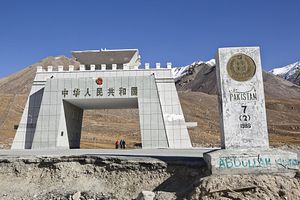Much to the befuddlement of the rest of the world – and as ironic as it is – Communist China and Islamic Pakistan are fast friends. It’s all hail to China in Pakistan and as other partnerships wither and die, these two countries continue to devote energy to strengthening their relationship. China has historically come to Pakistan’s rescue with economic, political, military and nuclear assistance and perhaps what was once a relationship founded on a mutual disillusionment with India has moved toward one with more aspirational intentions on both sides.
It would appear that Pakistan has been the greater beneficiary of this friendship – from military to economic assistance, China has stood by Pakistan, but is the friendship really that sustainable? Andrew Small from the German Marshall Fund certainly seems to think so. An Asia expert, Small recently published a book examining what he calls the unusual nature of the secretive relationship between China and Pakistan and argues that it is much more promising than Pakistan’s erratic ties with the U.S. And indeed, history supports this. On a visit to Pakistan earlier this year, China’s Foreign Minister Wang Yi assured Islamabad that China and Pakistan were in sync on all matters and have an “iron-clad” understanding between them, one that has taken years to hone and fortify.
Wang also announced at a meeting with his Pakistani counterpart that Chinese President Xi Jinping would be visiting Pakistan soon to discuss economic cooperation and support. Indeed, Beijing’s ambitious Silk Road initiative – in which the China Pakistan Economic Corridor (CPEC) is a part – running from China across South and Central Asia, makes a strong case for Chinese involvement and interest in Pakistan. The CPEC involves a major overhaul of infrastructure, with rail, roads, pipelines and ports in a bid to ease the energy crisis and increase investment in Pakistan. This is in addition to the China-Pakistan agreement on fiber optic cable that would connect Pakistan’s capital with Chinese borders, along with a $6.5 billion commitment to build a new nuclear power plant in Karachi. In fact, economic opportunities for Pakistan look endless, but given the increasingly serious state of terrorism in Pakistan, some find Beijing’s confidence in its “all-weather” friend a tad perplexing.
In fact, China and Pakistan function in a partnership carefully conditioned on their usefulness for each other. Beijing is mindful that Pakistan can play a significant role in China’s quest to establish itself as a strategic global power. An economic corridor in Pakistan would not only allow it to connect with South and East Asia, it would also serve as an alternative transportation network for Chinese energy into the Western world. Pakistan is not the only one to benefit.
A little known but important example is the Pakistan China Free Trade Agreement signed in 2006. Trade between Pakistan and China rose quickly, and China had become Pakistan’s top source of imports by 2009. China’s relative importance in Pakistan’s global trade has only increased, with total bilateral trade growing eight-fold in the past decade, whereas Pakistan’s total trade with the world only tripled in this time period. However, trade patterns paint a troubling picture for Pakistan: While China utilized 57 percent of the tariff concessions offered by Pakistan, Pakistan’s use of Chinese reductions was just 5 percent. This trickled down to local industries complaining that cheaper Chinese products were hurting high-cost local products. A second-phase China-Pakistan FTA is being negotiated, with Pakistan hoping for larger coverage and more immediate concessions. What Pakistan does not realize, however, and perhaps what Chinese negotiators use to their advantage, is that it is not such much the number of concessions, but their target.
A trade agreement with an economic giant such as China could have resuscitated Pakistan’s dwindling share in the global trade market but it did not even make a dent, in part because of Pakistan’s inability to ask for the right concessions. In fact, India and China’s bilateral trade grew more in comparison – rising by a factor of almost 11 in the past decade – without a trade deal with the across-the-board tariff concessions that Pakistan enjoys.
While the burden of responsibility of a failed FTA cannot be placed on China’s shoulders, it is important for Pakistan to recognize the essence of Chinese cooperation, which is conditional and transactional in nature. Andrew Small in an interview says: “Chinese investments are not purely for reasons of commerce or strategic economic geography – China knows that its friend is facing an uncertain future and is prepared to make these commitments in part in order to help shore the country up.” What Small perhaps refrained from mentioning is that the latter is true because China’s power-seeking interests are tied very closely with Pakistan’s stability and China’s contributions are expected to be paid for by Pakistan in kind.
Recently, not only has China wedged itself into the Afghan peace process, offering to mediate with the Taliban on behalf of Afghanistan when talks stalled, it is also using its diplomatic influence with Pakistan for more aggressive action against terrorist factions, actively assuming was once the role of Western powers. Pakistan should know that China will not be a bystander as terrorism persists on the borders of Afghanistan and Pakistan, given the threat of it spilling into China. Any assistance from China that does not serve Beijing’s larger goals would be contingent on how Pakistan handles the escalating problem of terrorism in the region.
While India’s growing importance to the U.S. is not a threat to Pakistan, it remains a major indicator that China is the single most important alliance that Pakistan could want. It would be extremely unfortunate for Pakistan if it failed to fully appreciate both the “worth” of China’s all-weather friendship and the cost – not just economic – of losing it.
Huma Sattar is a visiting analyst at the Heritage Foundation in Washington, D.C.

































